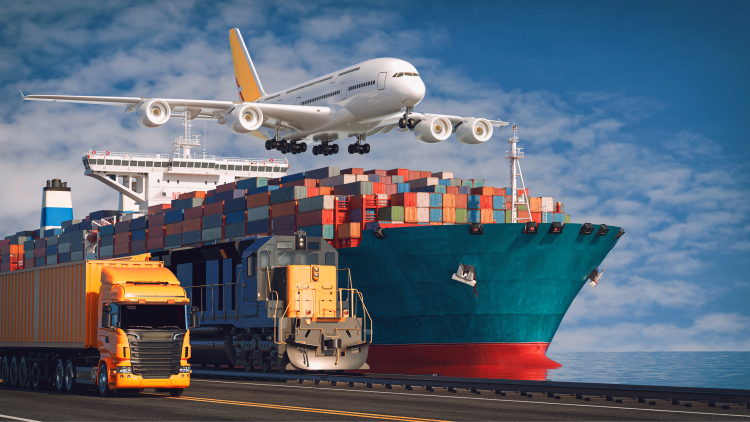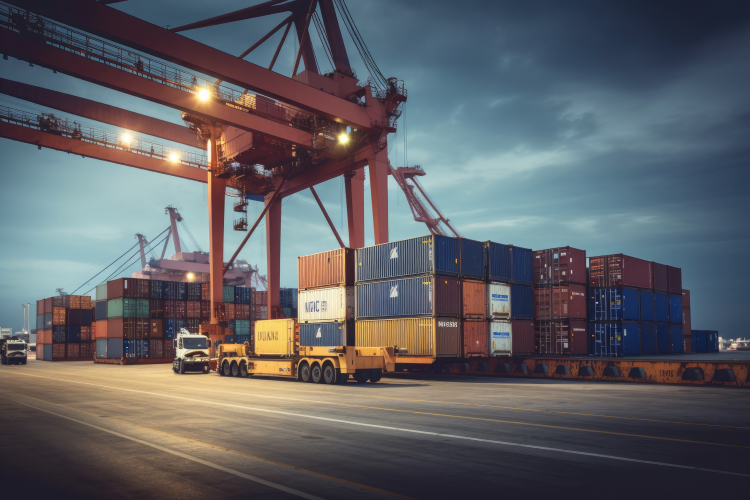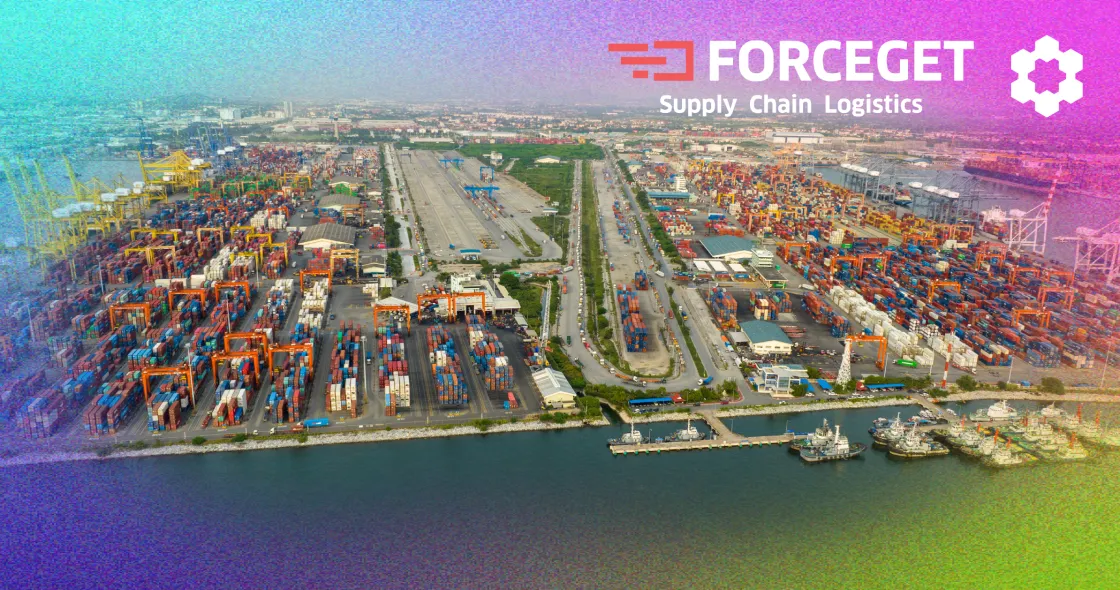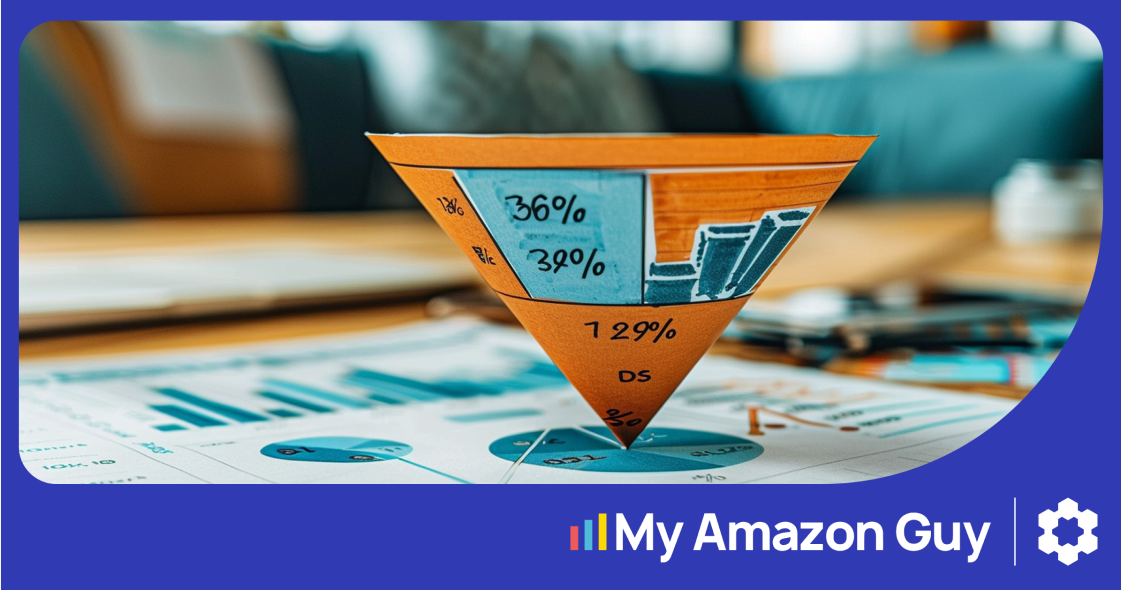The intricacies of international shipping can be a significant obstacle for Amazon sellers venturing into global markets, especially when having to choose between a freight forwarder vs broker or even 3PL.
As an Amazon seller, understanding the various aspects involved in moving your products across borders is essential for making informed decisions and ensuring a smooth shipping experience.
What is a Freight Forwarder?
A freight forwarder acts as an intermediary between you, the shipper (Amazon seller), and the carriers (shipping lines, airlines, freight train, etc.) responsible for transporting your goods internationally.

They go beyond simply booking shipments; they manage the entire end-to-end logistics process, offering a wide range of services, including:
Customs Clearance
Navigating complex customs regulations and paperwork can be a major hurdle. Freight forwarders handle this process on your behalf, ensuring your shipment complies with all import/export requirements and avoids delays at customs.
Freight Consolidation
Many Amazon sellers don’t have full container loads (FCL) for international shipping. Freight forwarders can consolidate your smaller shipments with others, reducing costs by sharing container space.
Documentation and Insurance
Preparing accurate shipping documents and obtaining proper cargo insurance is necessary. Freight forwarders handle these aspects, ensuring your shipment is properly documented and protected against potential damaged or lost inventory.
Warehousing and Distribution
Some freight forwarders offer warehousing and distribution services, providing storage solutions for your inventory near international fulfillment centers.
Route Planning and Negotiation
Freight forwarders have expertise in selecting the most efficient and cost-effective routes for your shipments. They can negotiate competitive rates with carriers, saving you money.
Real-time Tracking and Visibility
You’ll want to know the status of your shipment throughout its journey. Freight forwarders provide real-time tracking capabilities, allowing you to monitor your inventory’s progress.
What is a Customs Broker?
A customs broker is a licensed professional or company specializing in navigating customs regulations and procedures. They ensure import and export shipments comply with all government requirements, expediting the clearance process and avoiding delays.
Customs Broker vs Freight Forwarder
The difference between a customs broker vs freight forwarder is that customs brokers focus solely on the customs clearance process, ensuring smooth passage of goods through customs.
A freight forwarder vs customs broker manages the overall logistics of international shipping, including customs clearance (which some may outsource to customs brokers).
Freight Broker vs Forwarder
A freight broker vs forwarder acts as an intermediary, connecting shippers with carriers to find the most cost-effective transportation options. They don’t handle physical movement or customs clearance.
NVOCC vs Freight Forwarder
An NVOCC (Non-Vessel Operating Common Carrier) and a freight forwarder are both involved in the transportation of goods, but they serve different roles in the logistics process.
NVOCC
- An NVOCC is a type of carrier that offers ocean freight services but does not own the vessels used for transportation.
- NVOCCs consolidate smaller shipments into FCLs or less-than-container loads (LCLs) and book space with ocean carriers.
- They issue their own bills of lading, which serve as contracts of carriage between the shipper and the carrier.
- NVOCCs typically provide a range of services, including cargo consolidation, documentation, customs clearance, and inland transportation.
Freight Forwarder
- A freight forwarder is a company that arranges the movement of goods on behalf of shippers and consignees.
- Unlike NVOCCs, freight forwarders may handle various modes of transportation, including ocean, air, rail, and trucking.
- They negotiate rates with carriers, book cargo space, prepare shipping documentation, handle customs clearance, and manage inland transportation.
- Freight forwarders offer comprehensive logistics solutions tailored to the specific needs of their clients, including door-to-door services and cargo insurance.
While both NVOCCs and freight forwarders play key roles in international shipping, NVOCCs specialize in ocean freight services and issue their own bills of lading, whereas freight forwarders offer a broader range of logistics services across multiple modes of transportation and act as intermediaries between shippers and carriers.
Freight Forwarder vs Carrier
Carriers are companies responsible for physically transporting goods from one point to another, while freight forwarders act as an intermediary between the shipper (seller) and various transportation services.
Carriers operate the vehicles (trucks, ships, airplanes) that move the cargo and they focus primarily on transporting goods rather than managing the entire logistics process. While freight forwarders manage the logistics aspect and coordinate multiple carriers to move goods, carriers are responsible for the actual transportation of the freight.
What is 3PL?
A 3PL is a company that offers a wide range of outsourced logistics services. According to JungleScout, there are 2 million small and midsize third-party businesses selling on Amazon, 70% of them are 3PL sellers.

They can act as a one-stop shop for businesses with complex supply chains, managing various aspects of the fulfillment process.
- Warehousing: 3PLs provide storage space for inventory allowing you to scale your storage needs without managing your own warehouse.
- Distribution: They manage the movement of your products from the warehouse to fulfillment center or directly to customers.
- Freight Forwarding: Some 3PLs offer international shipping services, potentially including customs clearance (similar to freight forwarders).
- Fulfillment: This can encompass order fulfillment, pick-and-pack operations and shipment processing.
3PL vs Freight Forwarder
3PL offers a broader range of services, potentially including warehousing, distribution, fulfillment, and freight forwarding (which can encompass some customs brokerage).
Freight forwarder vs 3PL specialize in international shipping logistics, which uses customs clearance as a core service. Amazon sellers with simpler international shipping needs might find a freight forwarder more suitable.
Key Differences Between Freight Forwarder vs Broker vs 3PL vs NVOCC vs Carrier
While freight forwarders play a vital role in international shipping, it’s important to understand how they differ from other logistics providers:
| Service | Description | Focus |
|---|---|---|
| Freight Forwarder | Manages end-to-end international shipping logistics | Customs clearance, freight consolidation, documentation, route planning, tracking |
| Freight Broker | Connects shippers with carriers | Finding cost-effective transportation options |
| NVOCC | Offers ocean freight services, but does not own the vessels used for transportation | Specializes in ocean freight shipping and issues their own bills of lading |
| Carrier | Operates trucks, ships, or airplanes that move the cargo from origin to destination | Transporting goods rather than managing the entire logistics process |
| 3PL | Offers a wide range of logistics services | Warehousing, distribution, freight forwarding, fulfillment |
| Customs Broker | Specializes in customs regulations and clearance | Ensuring import/export compliance |
How to Choose the Right Shipping Provider for Amazon FBA Sellers
The ideal shipping provider depends on your specific needs and the scale of your international FBA operation when choosing between freight forwarder vs broker vs 3PL.
For simple international shipping with customs clearance, a freight forwarder can be a cost–effective solution.
For complex logistics needs, if you require warehousing, distribution, and fulfillment alongside international shipping, a 3PL might be a good option, but consider the potential cost implications.
Key Considerations When Choosing a Shipping Provider
Identify your specific shipping requirements. Are you shipping full container loads (FCL) or smaller quantities (LCL)?
Do you need warehousing and fulfillment services, or just international shipping with customs clearance.
Budget
Compare pricing structures of different providers. Freight forwarders often offer flexible pricing based on shipment size and destination. 3PLs typically charge based on a combination of storage space, pick-and-pack fees, and fulfillment services.
Experience
Choose a provider with experience handling shipments to yours. Look for companies familiar with Amazon FBA shipping requirements and the specific regulations of your target markets.
Technology and Visibility
Real-time shipment tracking and clear communication are essential. Look for providers with user-friendly online platforms that allow you to monitor your inventory’s location.
Use SoStocked’s built-in inventory tracking tool to maintain accurate and up-to-date records of your inventory levels across multiple suppliers, 3PLs, or FBA fulfillment centers. These tools help you monitor stock levels in real-time, track sales and replenishment, prevent stockouts, avoid overstocking, and optimize inventory management processes.
Common Challenges Faced by Amazon FBA Sellers During International Shipping
International shipments need to comply with the import/export regulations of both the origin and destination countries. This can involve complex paperwork and potential inspections by customs authorities when it comes to choosing between freight forwarder vs broker or 3PL.
Delays can occur due to:
Incorrect or missing documentation, even minor errors in customs documentation can lead to delays or even shipment returns.
Customs regulations can differ drastically from country to country. Choosing a shipping provider familiar with the specific regulations of your target markets helps ensure your shipments meet all compliance requirements.
Hidden fees and a lack of transparency in pricing structure can turn international shipping into a costly endeavor.
Failing to accurately calculate duties and taxes owed on your imported goods can result in unexpected charges of customs.
Some providers might have additional fees for services like document preparation, inspections, or storage at customs. Getting a clear breakdown of all associated costs upfront is essential.
Coordinating international shipping with Amazon FBA inventory management requires careful planning, especially when dealing with longer lead times. If your shipments are delayed, you risk stockouts at your Amazon fulfillment centers, negatively impacting your sales and customer satisfaction.
If you miscalculate lead times and order too much inventory, you could incur storage fees at fulfillment centers or be left with excess stock in a foreign market.
To prevent inventory issues like stockouts or delays, leverage SoStocked’s features to calculate and set lead times effectively. SoStocked offers two essential tools: Express Lead Time and Split Shipment.
Use Express Lead Time for calculating the fastest shipping methods, such as air freight, to ensure timely delivery during emergency situations. With Split Shipment, you have manual control over the input data, allowing you to split purchase orders (POs) into multiple shipments, such as a portion by air and a portion by sea.
By accurately calculating and setting lead times, you can mitigate the risk of running out of inventory and maintain smooth operations on Amazon.
Choosing Between Freight Forwarder vs Broker vs 3PL
By understanding the distinct roles of freight forwarders, customs brokers, 3PLs and freight brokers, you’ll be well-equipped to navigate the complexities of international shipping and choose the right partner for your specific Amazon FBA needs.
- Freight forwarders manage end-to-end logistics, including customs clearance, freight consolidation, documentation, route planning, and tracking. On the other hand, customs brokers specialize in navigating customs regulations and ensuring compliance.
- 3PLs offer comprehensive logistics services, including warehousing, distribution, fulfillment, and freight forwarding.
- NVOCCs focus on ocean freight services, issuing their own bills of lading.
- Carriers, such as trucking companies or airlines, physically transport goods.
The ideal solution depends on the complexity of your operations and the services you require. Research and compare providers, and prioritize those with experiences in Amazon FBA who have expertise within your target markets, as well as a proven track record of providing honest and transparent services.








